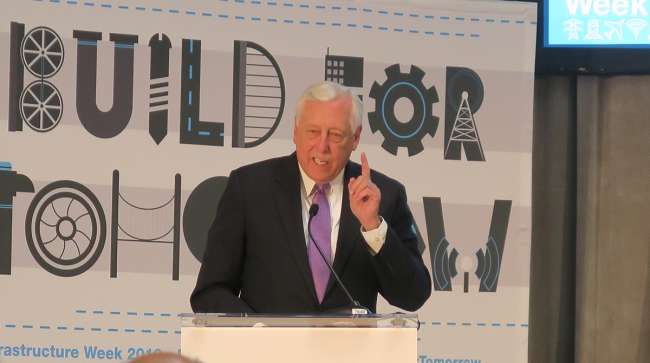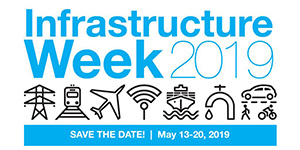Staff Reporter
Steny Hoyer Says Infrastructure Package Hinges on Presidential Support

WASHINGTON— The success of a federal infrastructure package will require the full and energetic support of President Donald Trump, Steny Hoyer (D-Md.), majority leader of the U.S. House of Representatives, said during an Infrastructure Week kickoff event May 13.
“The president must be ready to lead and convey to the American people the critical importance of substantial investment in infrastructure now and in the future,” Hoyer said. “If the president does not lead on how we’re going to fund this infrastructure investment, it will not happen.”
He was part of a private meeting with Trump and congressional Democrats on April 30 that resulted in an agreement for a $2 trillion infrastructure deal. The plan, which would bolster transportation projects, lacks details about fundraising.

The $2 trillion price tag exceeds the $1.5 trillion infrastructure plan initially floated by the Trump administration.
But Hoyer said during the kickoff event that no member of the House or Senate will “put their neck out” for a $2 trillion plan unless Trump publicly supports the idea.
Hoyer said committee chairmen are working on legislation that would bring about the kind of bold infrastructure investment that congressional leaders discussed with the president.
While lawmakers from both sides of the aisle agree that investment in infrastructure is sorely needed, they falter when it comes to agreeing on a source of revenue.
Neil Bradley, executive vice president of the U.S. Chamber of Commerce, said the group supports an increase to the fuel tax rate as the best choice to yield money for infrastructure projects.

Bradley speaks at the event. (Eleanor Lamb/Transport Topics)
“If you did that, you would unlock a lot of the money you need for highways, bridges and transit,” Bradley said. “The reality is there aren’t that many options. We’ve debated the options ad nauseam.”
The federal Highway Trust Fund, which supports road projects, has languished in recent years; it is funded in part through federal fuel taxes that have been stagnant at 24.4 cents a gallon for diesel and 18.4 cents a gallon for gasoline since 1993.
“It is insane that we think we can pay 2019 costs with 1993 income,” Hoyer said.
Bradley said that many states, including those with Republican legislatures, have enacted fuel tax hikes as a means to raise infrastructure investment.
Some states also have embarked on public-private partnerships (P3s) for transportation projects. Sean McGarvey, president of North America’s Building Trades Unions, said that while P3s are valuable, they are not a suitable alternative for every project. He said state and local agencies still need a “massive infusion” from the federal government.
Although Hoyer also acknowledged that private capital should have a role in transportation projects, he said the federal government needs to play a major role in supplying funds for infrastructure. House Speaker Nancy Pelosi (D-Calif.) has said that an infrastructure package should stipulate that about 20% of the funds would stem from nonfederal contributions.
“There is no substitute for robust public investment”—@LeaderHoyer on a federal infrastructure funding deal #BuildForTomorrow @InfraWeek pic.twitter.com/6dNJCrCUTJ — Eleanor Lamb (@eleanorannlamb) May 13, 2019
Hoyer urged the audience, largely made up of engineers and representatives from industry and policy groups, to use their platforms to spread the message about the importance of infrastructure. Several groups, including the American Society of Civil Engineers, American Road and Transportation Builders Association’s Transportation Construction Coalition and American Trucking Associations launched campaigns for infrastructure legislation.
“I want you to be focused on infrastructure month, infrastructure year and infrastructure every year until we get to a point where we need to be,” Hoyer said.

